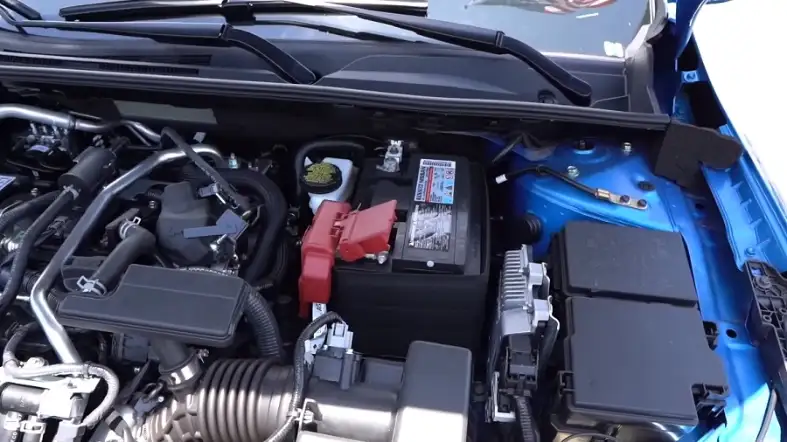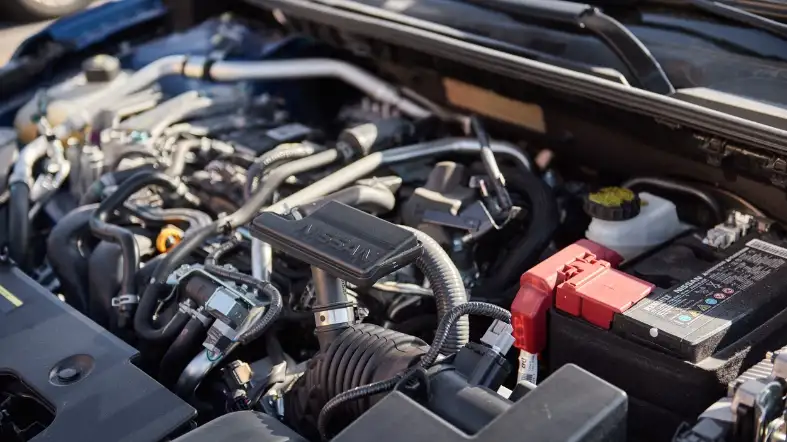If you’re a Nissan Sentra owner, you might have experienced the frustrating situation of your car failing to start, only to start without any issues moments later.
This intermittent starting problem is a common issue among Nissan Sentra owners, and it can be caused by a range of factors.
In this blog, we’ll explore some of the common causes of Nissan Sentra intermittent starting problems and things you can do to resolve them.
Nissan Sentra intermittent starting problems
Diagnosing and resolving intermittent starting problems in Nissan Sentra can be frustrating, but with the right approach, it is possible to identify and fix the issue. Here are some steps to follow:

Check the Battery
The first thing to check when a Nissan Sentra has intermittent starting problems is the battery.
Ensure the battery’s fully charged and properly connected. If the battery is old, replace it.
Inspect the Starter
If the battery is not the problem, the next thing to check is the starter. Inspect the starter for damage or wear and tear.
Look for signs of corrosion, loose connections, or a faulty solenoid.
Check the Alternator
Another possible cause of intermittent starting problems is a faulty alternator.
The alternator charges the battery and keeps the electrical system running. If the alternator is not functioning correctly, it can cause starting issues.
Inspect the Ignition Switch
The ignition switch turns the engine on and off. If the ignition switch is faulty, it can cause intermittent starting problems.
Inspect the ignition switch for damage, wear, and tear, or loose connections.
Check the Fuel System
If the battery, starter, alternator, and ignition switch are all functioning correctly, the next thing to check is the fuel system.
Inspect the fuel pump, fuel filter, and fuel injectors for damage, clogging, or other issues. A faulty fuel system can cause starting problems.
What are the common causes of intermittent starting problems in Nissan Sentras?

Intermittent starting problems can be frustrating, especially if you rely on your Nissan Sentra for transportation.
Here are some common causes of intermittent starting problems in Nissan Sentras:
Battery Issues:
A weak or drained battery can be a common cause of intermittent starting problems in Nissan Sentras.
Over time, batteries can lose their charge or become worn out, resulting in difficulty starting the engine.
Starter Problems:
The starter is responsible for initiating the engine’s combustion process.
If the starter is faulty or damaged, it may not consistently engage and start the engine, leading to intermittent starting problems.
Ignition Switch Malfunction:
The ignition switch is the component that allows you to start and stop the engine.
If it is malfunctioning, it can result in inconsistent starting behavior in your Nissan Sentra.
Fuel System Issues:
Issues with the fuel system, such as a clogged fuel filter or a faulty fuel pump, can disrupt the proper fuel delivery to the engine, causing intermittent starting problems.
Alternator Troubles:
The alternator is responsible for charging the battery while the engine is running.
If it is not functioning correctly, it may not properly charge the battery, leading to starting difficulties.
Electrical Problems:
Electrical issues, such as loose connections, corroded wires, or faulty sensors, can disrupt the normal functioning of the starting system in Nissan Sentras, resulting in intermittent starting problems.
Faulty Engine Control Module (ECM):
The ECM is the brain of the engine, controlling various functions, including starting.
If the ECM is malfunctioning or sending incorrect signals, it can result in starting issues.
Fuel Quality:
Poor fuel quality, such as contaminated or low-quality gasoline, can affect the performance of the engine and result in intermittent starting problems in Nissan Sentras.
Environmental Factors:
Extreme weather conditions, such as cold temperatures or high humidity, can affect the starting performance of a vehicle.
In colder climates, issues such as frozen fuel lines or a weak battery due to cold temperatures can result in starting problems.
Wear and Tear:
As vehicles age, various components can wear out, including spark plugs, ignition coils, or wiring.
These wear and tear issues can affect the starting system’s performance and result in intermittent starting problems.
How do you diagnose Nissan Sentra intermittent starting problems?

Diagnosing intermittent starting problems in Nissan Sentras requires a systematic approach to identify the root cause. Here are some steps to follow:
Battery Check:
Start by checking the battery voltage with a multimeter to ensure it has sufficient charge.
If the battery is low, recharge or replace it. Check for loose or corroded battery connections and clean them if needed.
Starter Inspection:
Inspect the starter for any visible signs of damage or wear, such as corrosion, loose connections, or a faulty solenoid.
Try tapping the starter gently with a rubber mallet to see if it engages. If the starter is suspected to be faulty, it may need to be replaced.
Ignition Switch Inspection:
Check the ignition switch for any visible damage, wear, or loose connections.
Make sure the switch is properly engaging when the key is turned to the start position. If the ignition switch is malfunctioning, replaced it.
Fuel System Check:
Inspect the fuel system components, with the fuel pump, fuel filter, and fuel injectors, for any damage, clogging, or other issues.
Check the fuel pressure to ensure it is within the manufacturer’s specifications. If any fuel system components are faulty, they need to repair or replace.
Alternator Test:
Test the alternator to ensure it is charging the battery properly. A malfunctioning alternator can result in starting problems.
Use a multimeter to check the alternator’s voltage output while the engine is running. If the alternator is not charging the battery, it will need to replace.
Electrical System Inspection:
Inspect the electrical system for any loose connections, corroded wires, or faulty sensors.
Check the fuses and relays related to the starting system. Repair or replace any electrical components that are found to be faulty.
Engine Control Module (ECM) Diagnosis:
If all other components are functioning correctly, but the problem persists, the ECM may be malfunctioning.
Diagnosis of the ECM requires specialized equipment and expertise, and it may need to be replaced if found to be faulty.
Environmental Factors Consideration:
Take into account any extreme weather conditions, like cold temperatures, or high humidity, that can affect the starting performance of the vehicle.
Consider using appropriate measures, such as warming up the engine in cold weather, to mitigate starting issues caused by environmental factors.
Road Test and Observation:
Perform a road test to observe the starting behavior of the Nissan Sentra under various driving conditions.
Note any specific patterns or occurrences of intermittent starting problems, such as when the engine is hot or cold, or after driving for a certain distance or time.
This information can help in further narrowing down the cause of the issue.
What are the possible solutions to Nissan Sentra starting issues?

If you are experiencing starting issues with your Nissan Sentra, here are some possible solutions to consider:
Battery Replacement:
If the battery is found to be weak or dead during diagnosis, replacing it with a new one may resolve the starting problem.
Make sure to choose a battery that meets the manufacturer’s specifications.
Starter Repair or Replacement:
If the starter is identified as the culprit, it may need to be repaired or replaced.
Repairing or replacing any damaged or faulty components of the starter, such as the solenoid or wiring, can help restore proper starting function.
Ignition Switch Replacement:
If the ignition switch is determined to be faulty, replacing it with a new one can resolve starting issues.
It is important to use a genuine Nissan replacement part and have it installed correctly.
Fuel System Repair or Replacement:
Repairing or replacing any damaged or clogged fuel system components, such as the fuel pump, fuel filter, or fuel injectors, can help improve starting performance.
Ensure that the fuel system is clean and functioning properly.
Alternator Replacement:
If the alternator is not charging the battery, replace it.
A faulty alternator can cause starting problems, so replacing it with a new one can restore proper charging and starting function.
Electrical System Repair:
Repairing or replacing any loose connections, corroded wires, or faulty sensors in the electrical system can help resolve starting issues.
Make sure all electrical components are properly connected and functioning as intended.
Engine Control Module (ECM) Replacement:
If the ECM is diagnosed faulty, it will need to be replaced. This should be done by a qualified mechanic or technician who has the proper equipment and expertise.
Environmental Factors Mitigation:
Taking appropriate measures to mitigate the effects of extreme weather conditions, such as using engine block heaters in cold weather, can help improve starting performance.
Regular Maintenance:
Performing regular maintenance, such as keeping the battery terminals clean, replacing worn-out components, and following the manufacturer’s recommended maintenance schedule, can help prevent starting issues from occurring in the first place.
troubleshooting tips for DIY diagnosis
If you are attempting to diagnose Nissan Sentra intermittent starting problems on your own, here are some troubleshooting tips to help you identify the possible causes:
Check the Battery:
Start by checking the battery voltage with a multimeter.
A weak or dead battery could be the culprit, so ensure it has sufficient charge and is within the manufacturer’s specifications.
Inspect the Starter:
Examine the starter for any visible signs of damage or wear, such as frayed wires or loose connections.
Make sure the starter is securely attached and functioning properly.
Test the Ignition Switch:
Use a multimeter to check the continuity of the ignition switch. If it fails to provide continuity in the correct positions, it may be faulty and in need of replacement.
Check the Fuel System:
Verify that there is fuel in the tank and that the fuel pump is functioning properly.
Inspect the fuel filter for any clogs or damage, and ensure the fuel injectors are clean and operating correctly.
Inspect the Alternator:
Test the alternator to ensure it is charging the battery properly. A faulty alternator can cause starting problems, so make sure it is functioning as intended.
Check the Electrical System:
Inspect all electrical connections and wires for any signs of damage, corrosion, or loose connections.
Ensure all sensors are properly connected and functioning as intended.
Scan for Error Codes:
Use a diagnostic tool to scan for any error codes stored in the Engine Control Module (ECM).
These codes can provide valuable information about any underlying issues that may be causing starting problems.
Check Environmental Factors:
Consider any environmental factors that may be affecting starting performance, such as extreme weather conditions.
Take appropriate measures, such as using engine block heaters in cold weather, to mitigate their effects.
Perform Regular Maintenance:
Make sure you are following the manufacturer’s recommended maintenance schedule for your Nissan Sentra, including regular battery checks, fuel system cleaning, and component replacements as needed.
FAQs
Can Extreme Weather Conditions Affect Nissan Sentra’s Starting Performance?
Yes, extreme weather conditions, such as extreme cold, can affect starting performance.
It is recommended to take appropriate measures, such as using engine block heaters, to mitigate their effects.
Should I Attempt To Repair Nissan Sentra Starting Problems On My Own?
If you are confident in your DIY skills, you can attempt to diagnose and repair starting problems on your own.
Seek assistance from a qualified mechanic or technician if you are not confident in your skills to avoid further damage or ineffective repairs.
Can Regular Maintenance Prevent Nissan Sentra From Starting Issues?
Yes, regular maintenance, such as following the manufacturer’s recommended maintenance schedule, including battery checks, fuel system cleaning, and component replacements, can help prevent starting issues.
Conclusion
Nissan Sentra intermittent starting problems can be frustrating and inconvenient for drivers.
It is important to regularly maintain your vehicle and address any issues promptly to prevent starting problems.
Proper diagnosis and repair of starting problems require attention to detail and knowledge of the vehicle’s systems.
Seeking assistance from a qualified mechanic or technician can help ensure effective repairs and prevent further damage to your Nissan Sentra.
